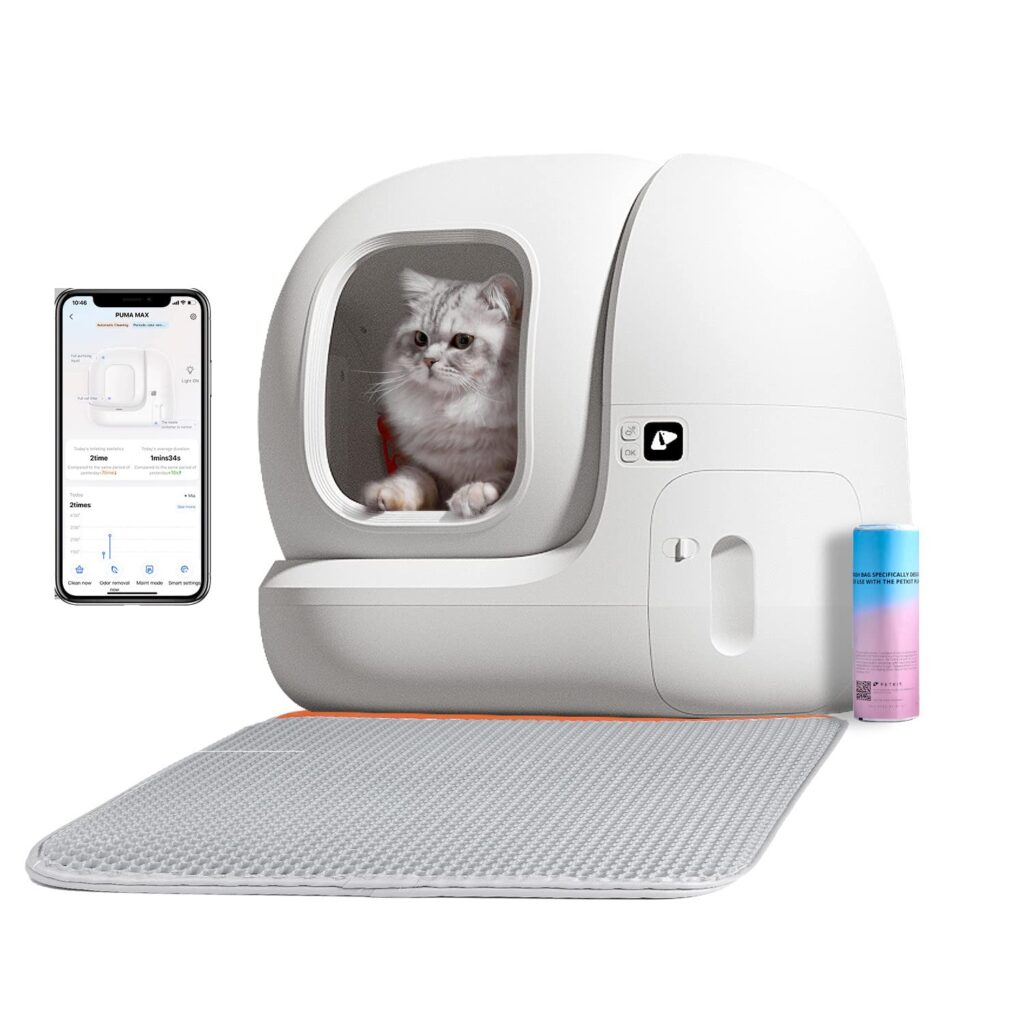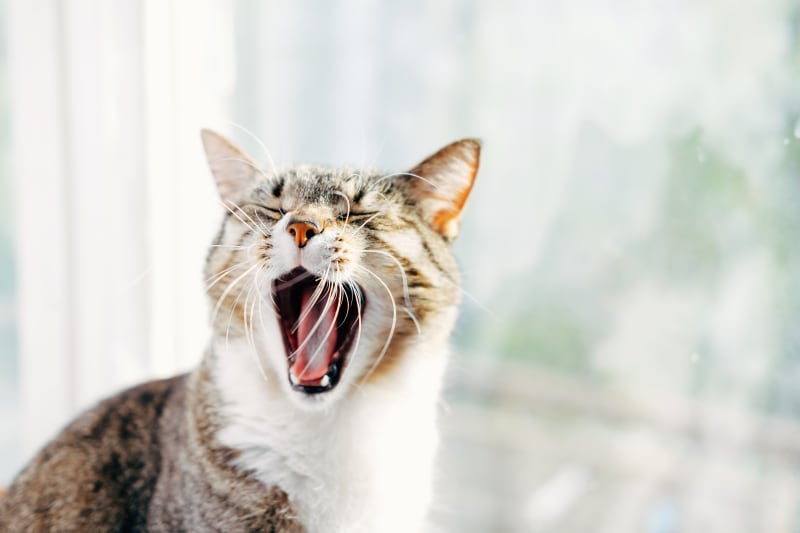If your cat is extremely skinny and you can feel her bones, it is important to consult a veterinarian immediately. A sudden and significant weight loss in cats can be a sign of an underlying health issue that requires medical attention.
Neglecting to address this could lead to further complications. Regular veterinary check-ups and a balanced diet specific to your cat’s needs are essential for maintaining a healthy weight and overall well-being. Pay attention to any other symptoms your cat may be displaying and share them with the veterinarian for a more accurate diagnosis.
Contents
- 1 Common Reasons For A Skinny Cat
- 2 Evaluating Your Cat’s Health
- 3 Strategies To Help Your Skinny Cat Gain Weight
- 4 Providing A Nutritious Diet For Your Cat
- 5 Ensuring Sufficient Caloric Intake
- 6 Addressing Specific Dietary Needs
- 7 Addressing Underlying Medical Issues
- 8 Dealing With Stress And Anxiety
- 9 Encouraging Physical Activity And Exercise
- 10 Frequently Asked Questions On My Cat Is So Skinny I Can Feel Her Bones! What Should I Do?
- 11 Conclusion
Common Reasons For A Skinny Cat
Having a skinny cat can be a cause for concern for any pet owner. There are several common reasons why cats may be underweight, including lack of appetite or picky eating habits, underlying medical conditions, and stress or anxiety affecting their appetite.
When cats have a decreased appetite or are picky eaters, it can be challenging to ensure they are getting enough nutrients. It’s important to offer a variety of high-quality, palatable foods and establish a regular feeding routine. Ensuring a quiet and stress-free feeding environment can also help stimulate their appetite.
| Medical conditions | Stress or anxiety |
|---|---|
| Cats with underlying medical conditions such as hyperthyroidism, diabetes, or gastrointestinal issues may experience weight loss. It’s essential to consult with a veterinarian to identify and treat any medical issues. | Stress or anxiety can significantly impact a cat’s appetite. Changes in the environment, the introduction of new pets, or separation anxiety can all contribute to decreased food intake. Providing a calm and secure environment and using techniques to reduce stress can help improve their appetite. |
If your cat is consistently losing weight or exhibiting other concerning symptoms, it is important to seek veterinary advice. They can perform a thorough examination and recommend appropriate interventions to help your cat achieve a healthy weight.

Credit: www.pawcbd.com
Evaluating Your Cat’s Health
In evaluating your cat’s health, it is important to check for visible signs of weight loss. Look for any changes in your cat’s appearance, such as her ribs or spine becoming more prominent. Cats are naturally lean, but drastic weight loss can be a cause for concern. Monitor your cat’s eating and drinking habits. If she is not consuming her normal amount of food or water, it could be an indication of an underlying issue. Another sign to look out for is any signs of pain or discomfort, such as limping or vocalizing when touched in certain areas. It is essential to pay attention to your cat’s overall behavior and well-being. If you notice any significant weight loss or changes in her health, consult with your veterinarian for a thorough examination and appropriate guidance.
Strategies To Help Your Skinny Cat Gain Weight
It can be concerning when you can feel your cat’s bones, but with the right strategies, you can help them gain weight. First and foremost, it’s important to consult with a veterinarian to ensure there are no underlying health issues causing weight loss. A proper diagnosis will guide your approach.
Next, you can adjust your cat’s diet and feeding routine. Offer high-quality, calorie-dense cat food that is suitable for weight gain. Split their meals into smaller, more frequent portions throughout the day to increase their calorie intake.
If necessary, your vet may recommend high-calorie supplements or appetite stimulants to help your cat eat more. These can come in the form of specialized wet food, nutritional pastes, or oral medications.
Remember to monitor your cat’s weight regularly and make adjustments as needed. With patience and the right strategies, your skinny cat can gradually gain weight and achieve a healthier body condition.
Providing A Nutritious Diet For Your Cat
When it comes to providing a nutritious diet for your cat, it is essential to choose a high-quality commercial cat food. Look for well-balanced options that are specifically formulated to meet your cat’s nutritional needs. These foods often contain the right balance of proteins, fats, and carbohydrates to support their overall health.
If you are considering a homemade or raw diet, make sure to consult with your veterinarian first. They can guide you on the proper way to prepare and provide a balanced diet for your cat. Raw diets, for example, may require additional supplementation to ensure all essential nutrients are covered.
When introducing new foods to your cat, do it gradually. This allows their digestive system to adjust and helps you track any preferences or potential allergies. Keep an eye on their weight and overall health, and make adjustments as needed to ensure they are getting the right amount of nutrients.
Ensuring Sufficient Caloric Intake
Ensuring sufficient caloric intake is essential to address your cat’s weight loss. Offering frequent, small meals throughout the day can help increase her caloric intake and ensure she is receiving enough nutrients. Avoid free-feeding to monitor portion sizes and prevent overeating. By controlling the amount of food she consumes, you can better manage her weight. Incorporating wet food or adding water to her kibble can also provide added hydration, which is crucial for overall health. Hydration is important for proper organ function and can contribute to weight gain in skinny cats. Providing her with a balanced diet that meets her nutritional needs is key to helping her gain weight and maintain a healthy body condition.
Addressing Specific Dietary Needs
When it comes to addressing specific dietary needs for a skinny cat, it’s important to consider potential food allergies or sensitivities. Some cats may be intolerant to certain ingredients, leading to weight loss. Discussing these concerns with a veterinarian can help identify and eliminate any potential allergens from the cat’s diet.
If the cat’s weight loss is due to a medical condition, specialized diets may be necessary. For example, cats with kidney disease, hyperthyroidism, or diabetes may require specific dietary adjustments and a balance of nutrients.
If you’re unsure about feeding your cat a suitable diet, consulting a veterinary nutritionist is always a good idea. They can provide personalized advice and ensure your cat is getting the right nutrients to maintain a healthy weight.
Addressing Underlying Medical Issues
Weight loss in cats can be concerning, especially when you can feel their bones. It is crucial to address any underlying medical issues that may be causing this. Veterinary evaluation and diagnosis is vital to determine the root cause. Here are some common health conditions that can cause weight loss in cats:
| Condition | Treatment/Management |
|---|---|
| Hyperthyroidism | Medication, surgery, or radioactive iodine therapy |
| Diabetes | Dietary changes, insulin therapy, monitoring blood sugar |
| Kidney disease | Dietary modifications, medication, fluid therapy |
| Gastrointestinal issues | Special diet, medication, probiotics |
| Dental problems | Professional dental cleaning, tooth extraction if necessary |
Remember, each condition requires specific treatments and management strategies. Consulting your veterinarian for accurate diagnosis and appropriate treatment plan is crucial for your cat’s well-being.
Dealing With Stress And Anxiety
Recognizing signs of stress in your cat is crucial in addressing their anxiety. Look out for behaviors such as excessive grooming, hiding, aggression, or changes in appetite. Providing a calm and soothing environment can significantly reduce their stress levels. Create a designated safe space for your cat by setting up a cozy bed or hiding spot away from noise and commotion. Additionally, use calming pheromone sprays or diffusers to create a soothing atmosphere.
To alleviate anxiety, provide enrichment activities to keep your cat mentally stimulated. Interactive toys, puzzle feeders, and scratching posts can redirect their focus and reduce stress. Incorporating play sessions into your routine and engaging in gentle bonding activities will help build trust and alleviate anxiety.
Remember to be patient; managing stress in cats is a gradual process. Consult with your veterinarian for further guidance and consider seeking behavioral interventions such as pheromone collars or supplements to complement the environmental changes.
Encouraging Physical Activity And Exercise
Encouraging physical activity and exercise is crucial to help your cat stay active and maintain muscle mass. Interactive play sessions are an excellent way to engage your cat in physical activity. Use toys such as feather wands, laser pointers, and interactive puzzle toys to keep your cat interested and moving. Set aside dedicated playtime each day to ensure your cat gets the exercise they need.
Additionally, cat furniture can help encourage movement. Provide climbing structures, scratching posts, and window perches to create opportunities for your cat to climb, jump, and explore. These activities promote muscle development and keep your cat active.
Remember that every cat is different, so observe your cat’s preferences and adjust accordingly. Some cats may prefer longer play sessions, while others may prefer shorter bursts of activity throughout the day. Find what works best for your cat and make it a regular part of their routine.
Frequently Asked Questions On My Cat Is So Skinny I Can Feel Her Bones! What Should I Do?
Is My Cat Too Thin If I Can Feel His Spine?
Yes, if you can feel your cat’s spine easily, it may be considered too thin. Consult a veterinarian for an evaluation and advice on proper nutrition and care.
Why Is My Cat Skinny And Bony?
A skinny and bony cat may be due to various reasons. These could include health issues, such as parasites or medical conditions. Stress, lack of appetite, or an improper diet may also contribute to weight loss. It’s important to consult a veterinarian to determine the underlying cause and provide the necessary treatment.
Is It Normal For A Cat To Feel Bony?
Yes, it is normal for a cat to feel bony. Cats have lean bodies and can often have a thin layer of fat, making their bones more noticeable to the touch. However, if the boniness is extreme or accompanied by signs of illness, it is best to consult a veterinarian.
How Can I Fatten Up My Skinny Cat?
To help your skinny cat gain weight, feed them high-calorie cat food, and consider adding wet food to their diet. Offer small and frequent meals throughout the day. Consult your vet for a proper feeding plan and ensure your cat gets regular exercise to stay healthy.
Conclusion
If you have noticed that your cat is abnormally skinny and you can feel her bones, it is essential to take action. Monitor her appetite, ensure her food is of high-quality, and consult a veterinarian for a thorough examination. By addressing any underlying health issues and implementing a proper diet and care regimen, you can help your cat regain a healthy weight and overall well-being.
Remember, a well-nourished and happy feline means a happier and longer life together.

Katie Lindsey is a passionate cat lover and founder of Cats Solution, a comprehensive resource for all things feline. With a lifelong love for cats and extensive knowledge in their care and behavior, she provides expert advice and solutions to cat owners. Through her website, Katie fosters a supportive community where cat enthusiasts can find guidance and heartwarming stories. A dedicated advocate for animal welfare, Katie also promotes responsible pet ownership and adoption. Join her on this purr-fect journey celebrating the joy of feline companionship.



